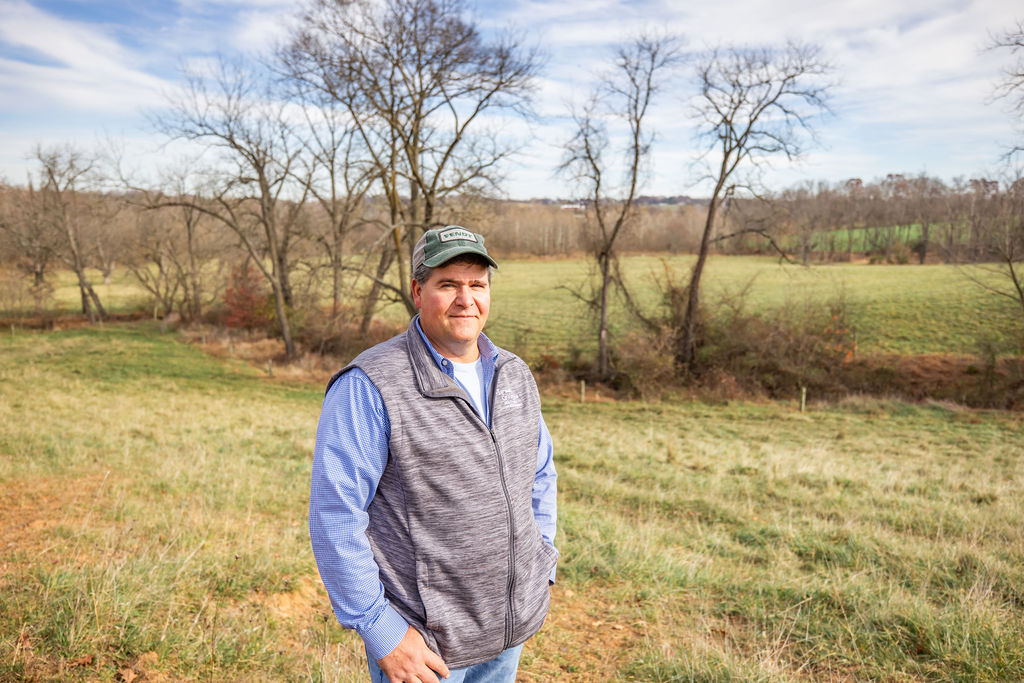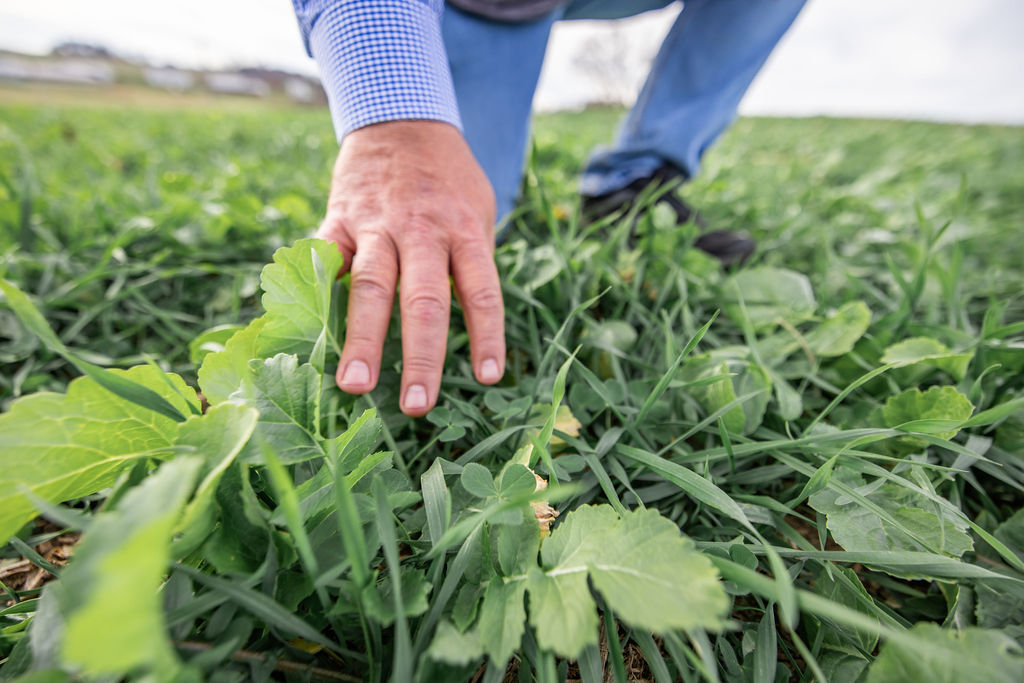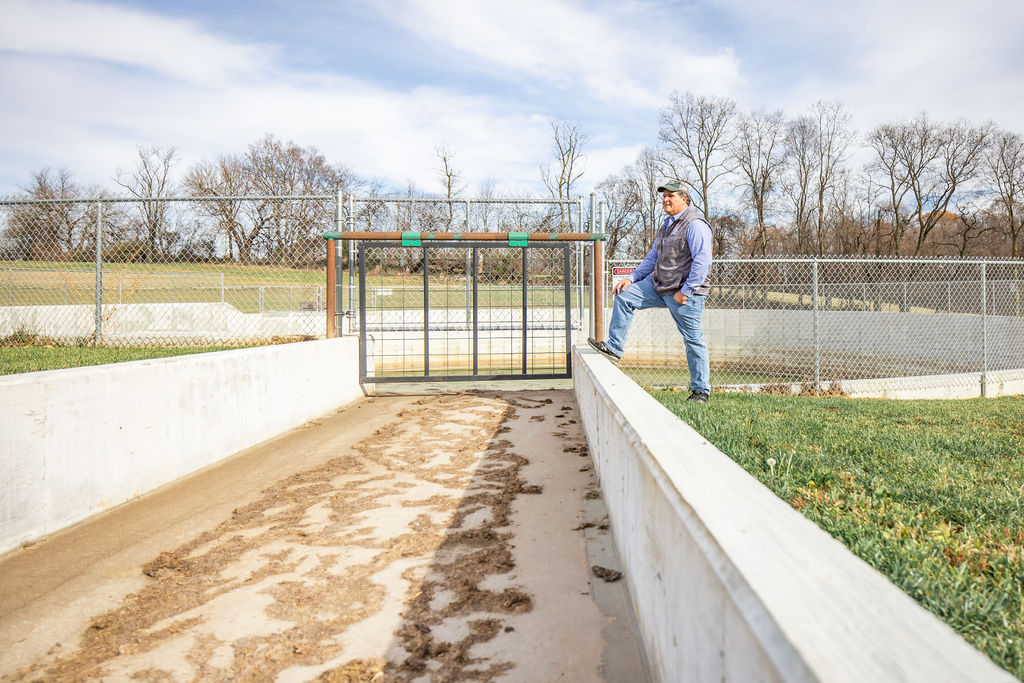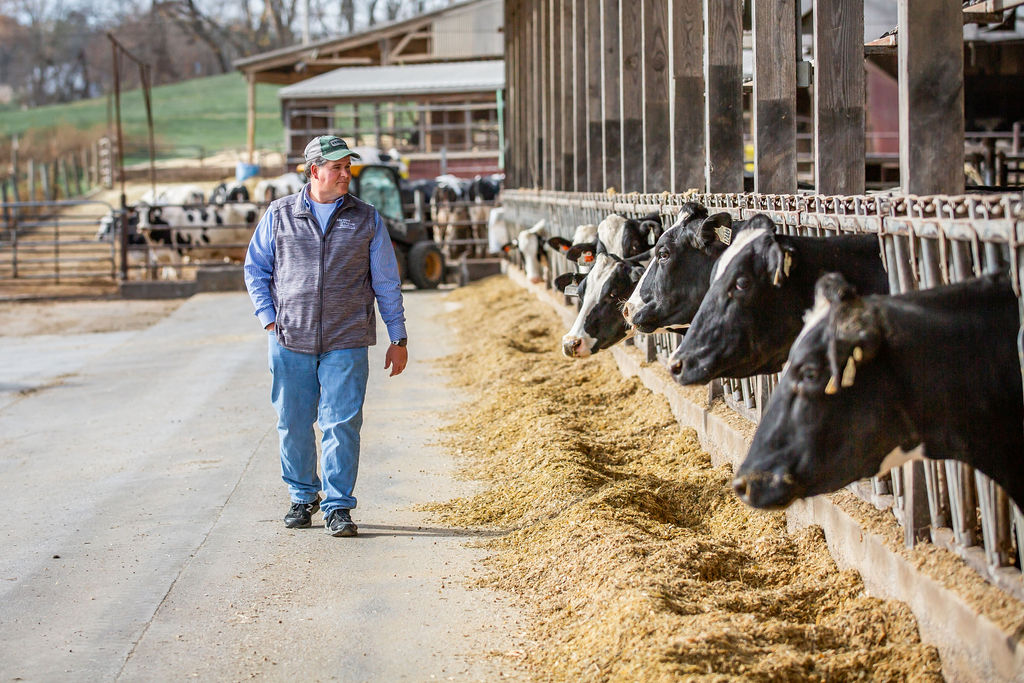
On the western edge of Carroll County in rural Maryland, where farms are tucked into rolling hills along curving roads, husband and wife team Matt and Debra Hoff operate Coldsprings Farm, home to their family, employees, and a herd of dairy cows.
A Maryland & Virginia (MDVA) member farm since 1952, Coldsprings Farm is a testament to the power of conservation and sustainable agriculture. With a dedication to preserving the environment and a commitment to improving their farm, this dairy farmer’s story sheds light on the opportunity to define a farm’s legacy by recognizing the importance of responsible stewardship.
Matt Hoff’s motivation for embracing sustainable practices on the farm is layered. While some changes were driven by regulatory requirements, Matt and his late father recognized the importance of sustainable farming practices early on. Some of these practices include manure storage, cover crops, and no-till farming. Coldsprings Farm always maintained manure storage to handle the winter months, which not only adhered to regulations, but also provided a stockpile of nutrients to incorporate back into the soil come spring. Hoff describes the transition to cover cropping as a pivotal moment in the farm’s commitment to sustainability.
“I remember leaving the ground open over winter as a kid and how hard and compact it would become.” The first time he learned about cover crops was in the 90s when his local U.S. Department of Agriculture (USDA) Natural Resources Conservation Service (NRCS) office offered the program to farmers. From there Hoff’s curiosity was piqued and he attended national no-till conferences and leveraged incentives from state-level programs in Maryland. “The more I learned about no-till and cover cropping, the more I was interested in it. Today we use modern nutrient management practices – and always add something green. One hundred percent of our ground is in cover crops.”
 Implementation and Challenges
Implementation and Challenges
Transitioning to sustainable farming methods hasn’t been without challenges. The significant upfront costs of sustainability projects, though often reimbursable, pose a hurdle, particularly for dairy farms with fluctuating cash flows.
“Lots of times the government programs will pay for projects, but after the fact. This is a huge challenge for dairy farmers. We tend to do big projects only in years when milk prices are good.”
Hoff describes a leachate runoff project that was on hold for nearly three years due to this challenge. He says that even if up-front funding was offered, there are still challenges getting these projects completed. He continues to push NRCS to consider working directly with builders and suppliers to help speed up the process.
The Importance of Partnerships
Partnerships have played a crucial role in Hoff’s sustainability journey. He acknowledges that the NRCS and the Farm Service Agency (FSA) understand and address the concerns and hesitations of farmers like him. Hoff’s relationship and reputation with his Soil Conservation District has helped secure funding, and working closely with the agency has proven essential.
“We are fortunate to have an excellent soil conservation office in our county. They’re receptive to our project ideas and help us apply for funding to realize those ideas.” This partnership was instrumental in Coldsprings receiving Regional Conservation Partnership Program (RCPP) funds to install a sileage leachate runoff project. NRCS and FSA helped Hoff implement filter strips and wildlife areas.
receptive to our project ideas and help us apply for funding to realize those ideas.” This partnership was instrumental in Coldsprings receiving Regional Conservation Partnership Program (RCPP) funds to install a sileage leachate runoff project. NRCS and FSA helped Hoff implement filter strips and wildlife areas.
Additionally, through the FSA, Hoff was able to participate in the Conservation Reserve Enhancement Program (CREP), allowing him to receive payments for setting aside agricultural acres for conservation over a 10-15 year period. Coldsprings Farm rests within the Middle Little Pipe Creek and ultimately drains into the challenged Chesapeake Bay.
To capitalize on environmental interest in the Chesapeake Bay Watershed, MDVA works closely with conservation partners like the Alliance for the Chesapeake Bay and Sustainable Chesapeake to connect producers to available funds to meet environmental goals. Through MDVA’s relationship with the Alliance, Coldsprings Farm was able to complete a tree planting to improve local water quality. This practice, combined with manure injection (which MDVA’s Sustainability Program also helped fund), proper manure storage, and cover cropping greatly reduce runoff and help to improve the health of local waterways. And the crown jewel of leveraging relationships? Hoff’s 412-foot composted bedded pack barn which was funded through EQIP, NRCS, and state cost-share programs. Economic and Environmental Impact People have taken interest in Hoff’s sustainability projects over the years.
He says that people ask to come look at his composted bedded pack barns (he has six of them), manure storage, and his approach to cover crops. One of the most significant impacts of Hoff’s embrace of sustainability has been the improvement in soil health and water quality. Hoff’s commitment to preserving the land has resulted in sileage leachate and gray water being reintegrated into the soil, mitigating environmental harm.
The introduction of wildlife areas on the farm has led to a remarkable return of wildlife and an increase in biodiversity on the farm. More geese and ducks can be observed at Coldsprings compared to 30 years ago, as well as the presence of wild turkeys, a species not previously seen on the farm.

Looking Forward
The legacy of Coldsprings Farm centers on continued sustainability. Hoff’s message to fellow farmers interested in sustainability is clear: maintain a good rapport with your soil conservation district, work collaboratively with and leverage funding MDVA secures and other sources, and always embrace change.

